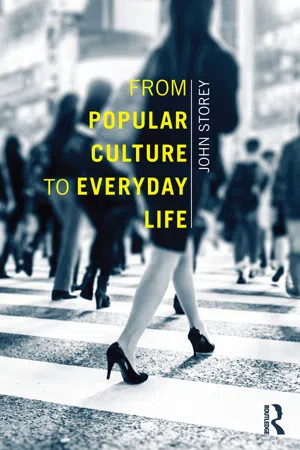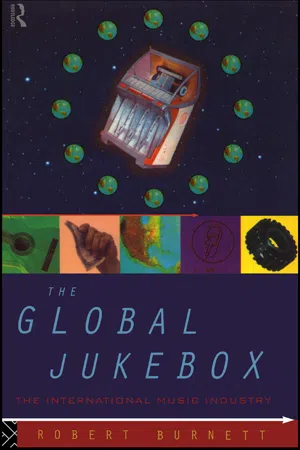American Pop Culture
American pop culture refers to the elements of mainstream culture in the United States that are widely embraced and recognized. It encompasses various forms of entertainment, fashion, food, and technology that have gained popularity and influence both domestically and internationally. American pop culture has been shaped by diverse influences and continues to evolve with the changing social and technological landscape.
3 Key excerpts on "American Pop Culture"
- eBook - ePub
Cultural Theory and Popular Culture
An Introduction
- John Storey(Author)
- 2018(Publication Date)
- Routledge(Publisher)
...in the great cities of the United States, and above all in New York’ (Maltby, 1989: 11; my italics). The claim that popular culture is American culture has a long history within the theoretical mapping of popular culture. It operates under the term ‘Americanization’. Its central theme is that British culture has declined under the homogenizing influence of American culture. There are two things we can say with some confidence about the United States and popular culture. First, as Andrew Ross (1989) has pointed out, ‘popular culture has been socially and institutionally central in America for longer and in a more significant way than in Europe’ (7). Second, although the availability of American culture worldwide is undoubted, how what is available is consumed is at the very least contradictory (see Chapter 10). What is true is that in the 1950s (one of the key periods of Americanization), for many young people in Britain, American culture represented a force of liberation against the grey certainties of British everyday life. What is also clear is that the fear of Americanization is closely related to a distrust (regardless of national origin) of emerging forms of popular culture. As with the mass culture perspective generally, there are political left and political right versions of the argument. What are under threat are either the traditional values of high culture, or the traditional way of life of a ‘tempted’ working class. There is what we might call a benign version of the mass culture perspective. The texts and practices of popular culture are seen as forms of public fantasy. Popular culture is understood as a collective dream world. As Richard Maltby (1989) claims, popular culture provides ‘escapism that is not an escape from or to anywhere, but an escape of our utopian selves’ (14)...
- eBook - ePub
- John Storey(Author)
- 2014(Publication Date)
- Routledge(Publisher)
...The claim that popular culture is American culture has a long history within the theoretical mapping of popular culture. It operates under the term ‘Americanization’. Its central theme is that other cultures have declined or are declining under the supposedly homogenizing influence of American culture. There are two things we can say with some confidence about the United States and popular culture. First, as Andrew Ross has pointed out, ‘popular culture has been socially and institutionally central in America for longer and in a more significant way than in Europe’ (1989: 7). Second, although the availability of American culture worldwide is undoubted, how what is available is consumed is at the very least contradictory (see Storey 2010a). What is true is that in the 1940s and 1950s (one of the key periods in debates about Americanization), for many young people in Britain, American culture represented a force of liberation against the grey certainties of British everyday life. But this aspect and these possibilities of American culture mostly remain invisible because Americanization, as a theoretical position, tends to operate with a very limited concept of the ‘foreign’. It usually assumes that what is foreign is always a question of national difference. But what is foreign can equally be a question of class, ethnicity, gender, sexuality, generation, or any other marker of social difference. Moreover, what is foreign in terms of being imported from another country may be less foreign than differences already established by, say, class or generation. Furthermore, the imported foreign may be used against the prevailing power relations of the ‘local’...
- eBook - ePub
The Global Jukebox
The International Music Industry
- Robert Burnett(Author)
- 2002(Publication Date)
- Routledge(Publisher)
...It is the advanced, urban, market economies that produce and shape the social relations and institutions in which popular culture as we know it can develop. Obviously then we are not using the term popular culture to describe the culture of the people, for it is equally obvious that all people in all societies have a culture. What is unique about popular culture has been characterized in the following attributes by Todd Gitlin (1981:202): centralized, corporate production (often multinational) and privatized consumption; pervasiveness, and with it the potential for unifying the private domain with a ‘new order of experience’; vast volume of output, structured obsolescence and rhythmic cycles of style and celebrity to maximize continuing turnover; secularity, despite the ritualized form of many popular events, from sport to popular music. For Gitlin, these attributes of popular culture enable it to be understood as a peculiarity of modern corporate capitalism, which in effect: presses popular culture into distinctive molds, and shapes it to particular uses… These modern traits make it all the easier for popular culture to infuse everyday life, and to embody and reproduce the dominant complex of ideology: In the West, the legitimacy of private control of production, and of the national security state; the necessity of individualism, of status hierarchy, of consumption as the core measure of achievement; and overall, as in every society, the naturalness of the social order. (1981:203) From Gitlin’s perspective, popular culture plays an important role in the reproduction of dominant values and social relationships in society. Popular culture has, in fact, an ideological function to fulfil. A slightly different way of viewing popular culture is posited by Fiske (1989:24) who claims that; ‘popular culture is made by the people, not produced by the culture industry’. Popular culture is what people produce in their interaction with the products of the culture industries...


